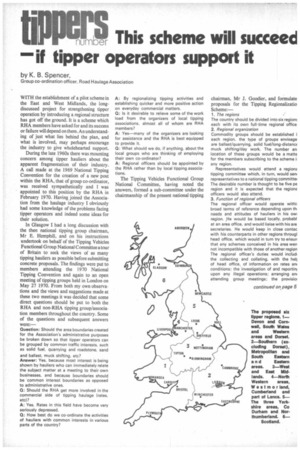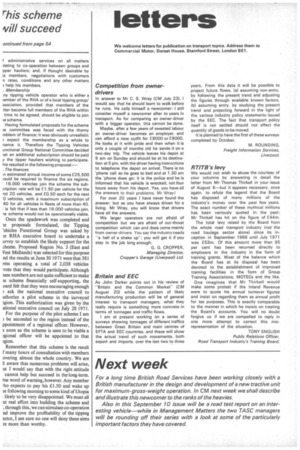by K. B. Spencer,
Page 56

Page 59

If you've noticed an error in this article please click here to report it so we can fix it.
Group co-ordination officer, Road Haulage Association WITH the establishment of a pilot scheme in the East and West Midlands, the longdiscussed project for strengthening tipper operation by introducing a regional structure has got off the ground. It is a scheme which RHA members have asked for and its success or failure will depend on them. An understanding of just what lies behind the plan, and what is involved, may perhaps encourage the industry to give wholehearted support.
During the late 1960s there was mounting concern among tipper hauliers about the apparent fragmentation of their industry. A call made at the 1969 National Tipping Convention for the creation of a new post within the RHA, that of group co-ordinator, was received sympathetically and 1 was appointed to this position by the RHA in February 1970. Having joined the Association from the haulage industry I obviously had some knowledge of the problems facing tipper operators and indeed some ideas for their solution.
In Glasgow I had a long discussion with the then national tipping group chairman, Mr E. Hemphill, and on his instructions undertook on behalf of the Tipping Vehicles Functional Group National Committee a tour of Britain to seek the views of as many tipping hauliers as possible before submitting concrete proposals. The findings were put to members attending the 1970 National Tipping Convention and again to an open meeting of tipping groups held in London on May 27 1970. From both my own observations and the views and suggestions made at these two meetings it was decided that some direct questions should be put to both the RHA and non-RHA tipping group/association members throughout the country. Some of the questions and subsequent answers were:— Question: Should the area boundaries created for the Association's administrative purposes be broken down so that tipper operators can be grouped by common traffic interests, such as solid fuel, quarrying and roadstone, sand and ballast, muck shifting. etc?
Answer: Yes, because most interest is being shown by hauliers who can immediately relate the subject matter at a meeting to their own businesses, and because boundaries should be common interest boundaries as opposed to administrative ones.
Q: Should the RHA get more involved in the commercial side of tipping haulage (rates, etc)?
A: Yes. Rates in this field have become very seriously depressed.
Q: How best do we co-ordinate the activities of hauliers with common interests in various parts of the country? A: By regionalizing tipping activities and establishing quicker and more positive action on everyday commercial matters.
Q: Is it desirable to relieve some of the work load from the organizers of local tipping associations, almost all of whom are RHA members?
A: Yes—many of the organizers are looking for assistance and the RHA is best equipped to provide it.
Q.: What should we do, if anything, about the local groups who are thinking of employing their own co-ordinator?
A: Regional officers should be appointed by the RHA rather than by local tipping associations.
The Tipping Vehicles Functional Group National Committee, having noted the answers, formed a sub-committee under the chairmanship of the present national tipping
chairman, Mr J. Goodier, and formulate proposals for the Tipping Regionali7atio Scheme:
1. The regions The country should be divided into six region: each with its own full-time regional office 2. Regional organization Commodity groups should be established i each region, the type of groups envisage are ballast/quarrying, solid fuel/long-distancE muck shifting/day work. The number an location of these groups would be a matte for the members subscribing to the scheme ii any region.
Representatives would attend a regionz tipping committee which, in turn, would seni representatives to a national tipping committei The desirable number is thought to be five pe region and it is expected that the region officers would also attend.
3. Function of regional officers The regional officer would operate withii broad terms of reference depending upon th. needs and attitudes of hauliers in his owi region. He would be based locally, probabl at an area office, and would liaise with his are secretaries. He would keep in close contac with his counterparts in other regions througl head office, which would in turn try to erisur, that any schemes conceived in his area wen not incompatible with those of another region The regional officer's duties would includ, the collecting and collating, with the hell of head office, of information on rates am conditions: the investigation of and reportim upon any illegal operations; arranging am attending group meetings; the provisioi f administrative services on all matters lating to co-operation between groups and pper hauliers; and, if thought desirable by is members, negotiations with customers n rates, conditions and any other matters ) help his members.
. Membership ,ny tipping vehicle operator who is either a iember of the RHA or of a local tipping group/ Isociation, provided that members of the tter become full members of the HI-IA within time to be agreed, should be eligible to join le scheme.
Having formulated proposals for the scheme le committee was faced with the thorny roblem of finance; it was obviously unrealistic ) expect the membership as a whole to nance it. Therefore the Tipping Vehicles unctionai Group National Committee decided iat an additional subscription should be paid y the tipper hauliers wishing to participate. his resulted in the following proposal The finances
,n estimated annual income of some €25,500 rould be required to finance the six regions. 18,000 vehicles join the scheme the subcription rate will be £1.50 per vehicle for the rst 20 vehicles, and €0.50 each for the next 0 vehicles, with a maximum subscription of 40 for all vehicles in fleets of more than 40. is felt that if less than 18,000 vehicles join. )e scheme would not be operationally viable. Once the spadework was completed and le proposals formulated, the Tipping 'ehicles Functional Group was asked by
RHA executive board to undertake a urvey to establish the likely support for the cherne. Proposed Region No. 3 (East and Vest Midlands) was selected for this purpose nd the results at June 30 1971 were that 381 rrns operating a total of 2,038 vehicles
r
rote that they would participate. Although iese numbers are not quite sufficient to make ie scheme financially self-supporting, the oard felt that they were encouraging enough ) ask the national executive council to uthorize a pilot scheme in the surveyed lion. This authorization was given by the ational executive council on July 28 1971. For the purpose of the pilot scheme I am ) be seconded to the region instead of the ppointment of a regional officer. However, s soon as the scheme is seen to be viable a ;gional officer will be appointed to that :gion.
Remember that this scheme is the result f many hours of consultation with members overing almost the whole country. We are II aware that numerous problems will arise, ut I would say that with the right attitude cannot help but succeed in the long-term. nme word of warning, however. Any member ,ho expects to pay his £1.50 and wake up ie following morning to some kind of Utopia likely to be very disappointed. We must all ut real effort into building the scheme and through this, we can stimulate co-operation nd improve the profitability of the tipping Ntor, I am sure no one will deny these aims re more than worthy.










































































































































